Mitigating Risk Factors for Missionary Kids
Mitigating Risk Factors for Missionary Kids
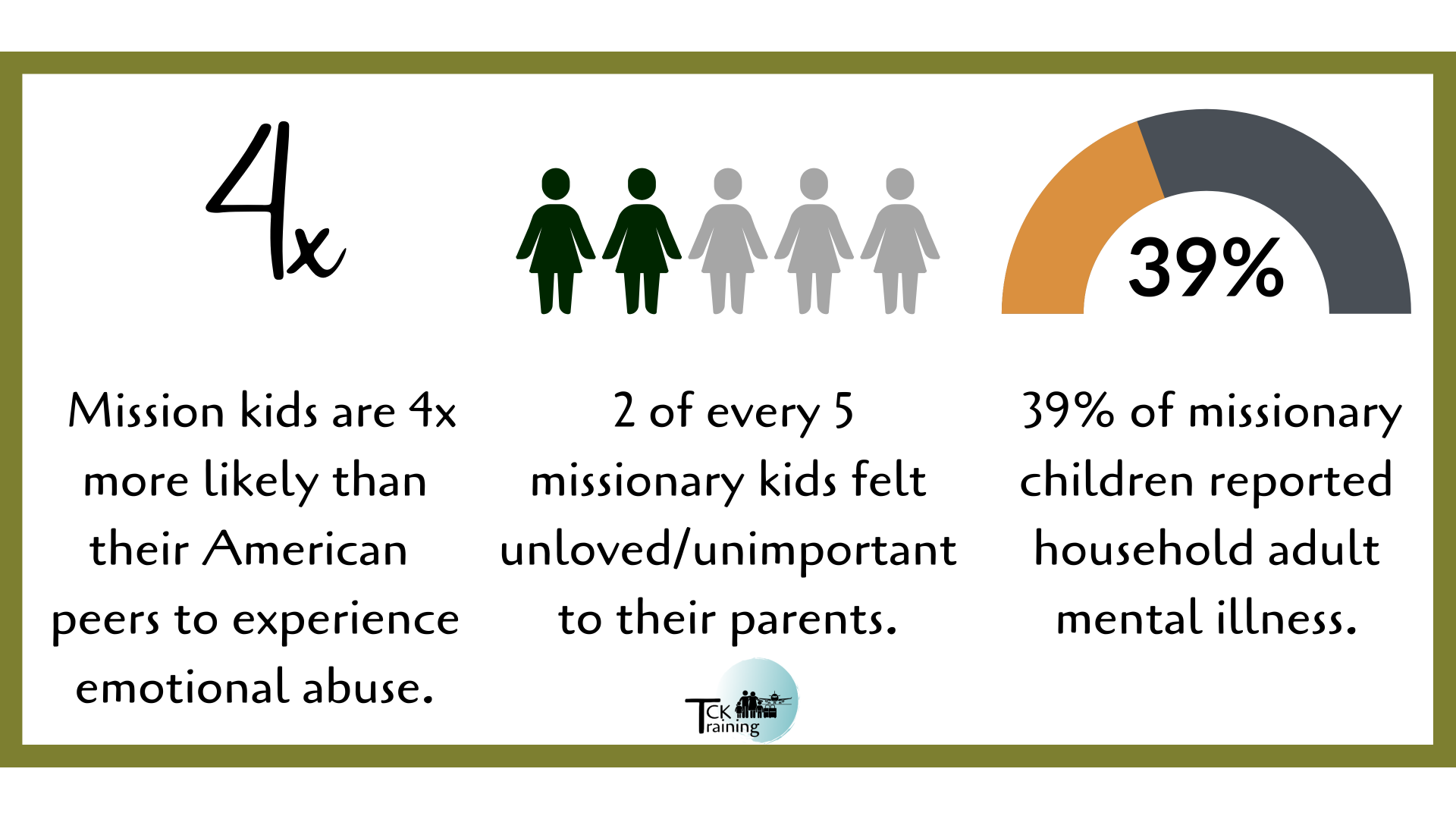
We saw consistently different results across categories among TCKs born before/after 1980 – with the Boomer/Gen X generations on one side, and the Millennial/Gen Z generations on the other. This also delineates the groups who were/were not impacted by the internet during childhood.
Abuse
Abuse is broken down into three categories: physical, emotional and sexual. Missionary kids in our survey were half as likely to experience physical abuse as their American peers, however they were four times as likely to experience emotional abuse. Our survey also revealed that 1 out of every 5 missionary kids experienced sexual abuse.
While child-to-child sexual abuse was not included in the original ACE study, it is worth noting due to the lasting effects. Over 1 in 4 missionary kids reported experiencing child-to-child sexual abuse – the highest rates among all sectors – with no significant difference between generations. For those who had experienced child-to-child sexual abuse, there were higher rates of emotional abuse (65%) and adult-to-child sexual abuse (44%), as well as emotional neglect (54%).
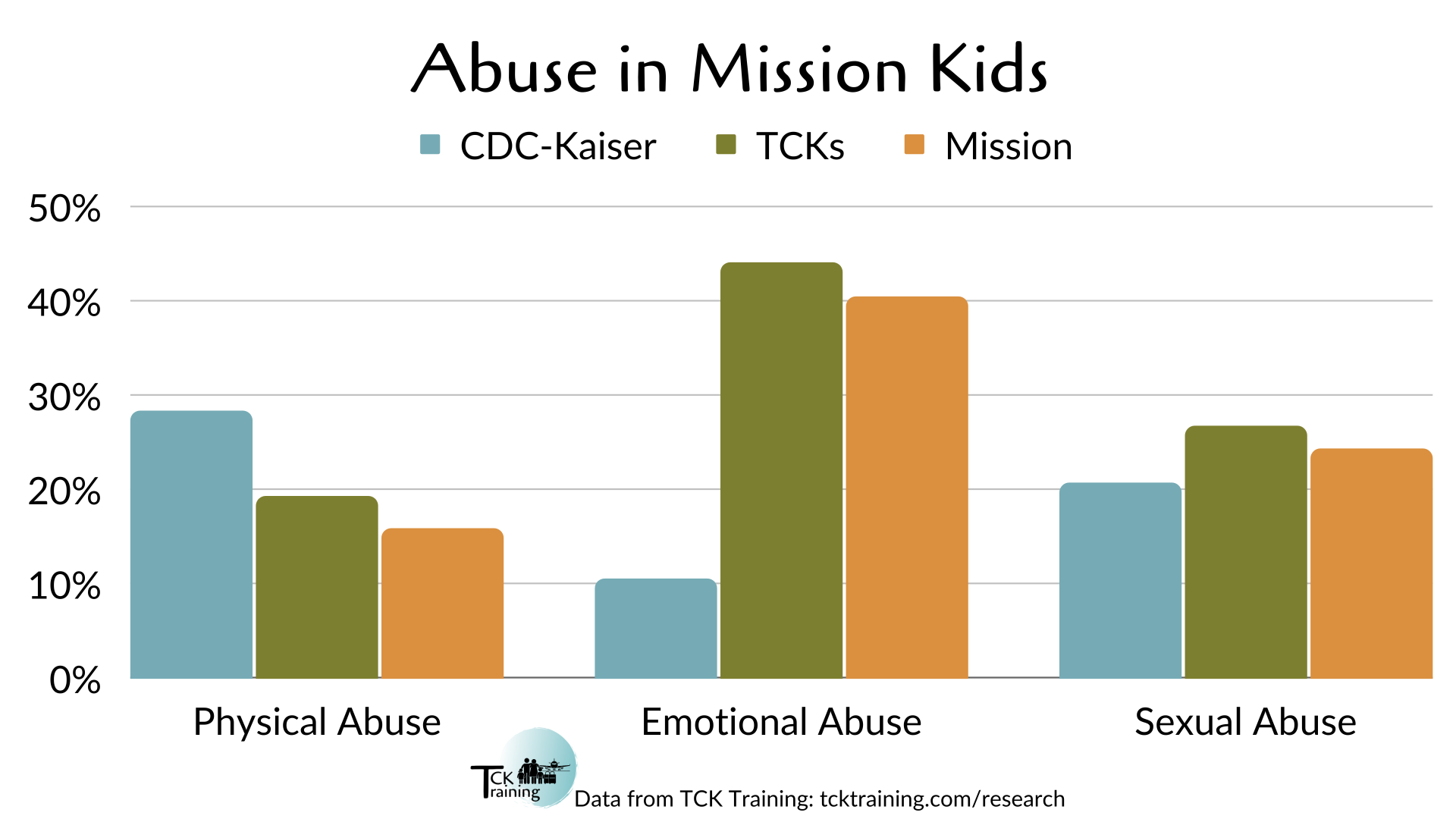
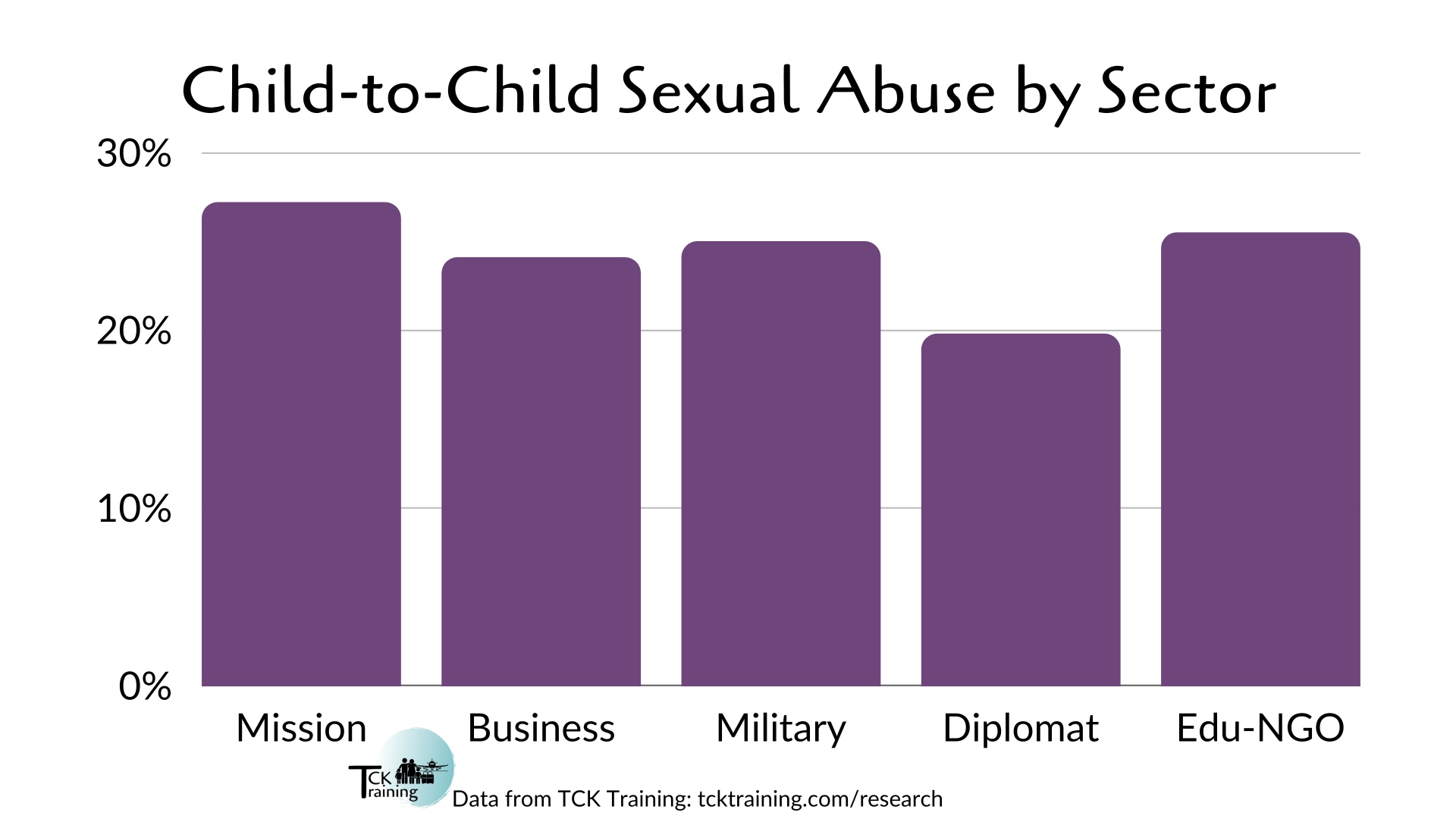
Neglect is defined through the lens of perception, where a child feels/worries their emotional/physical needs will not be met. While physical neglect is often seen as an extension of poverty, in the ACE context it is not just about what the child has access to but also about their security that provision will continue in the future. In cases of emotional neglect, a child feels unloved or unimportant – even if their parents actually do love them. In cases of physical neglect, a child feels their physical needs may not be met – even if they are always fed and cared for. This can look like worry that they will not have enough food, shelter, clean clothing, protection, or medical care.
Physical neglect among missionary kids was nearly 1.5x higher than among Americans, and nearly 2x higher than among non-mission TCKs. Of those born after 1980, 15% of missionary kids reported feeling physically neglected, compared to 11% of the older generation.
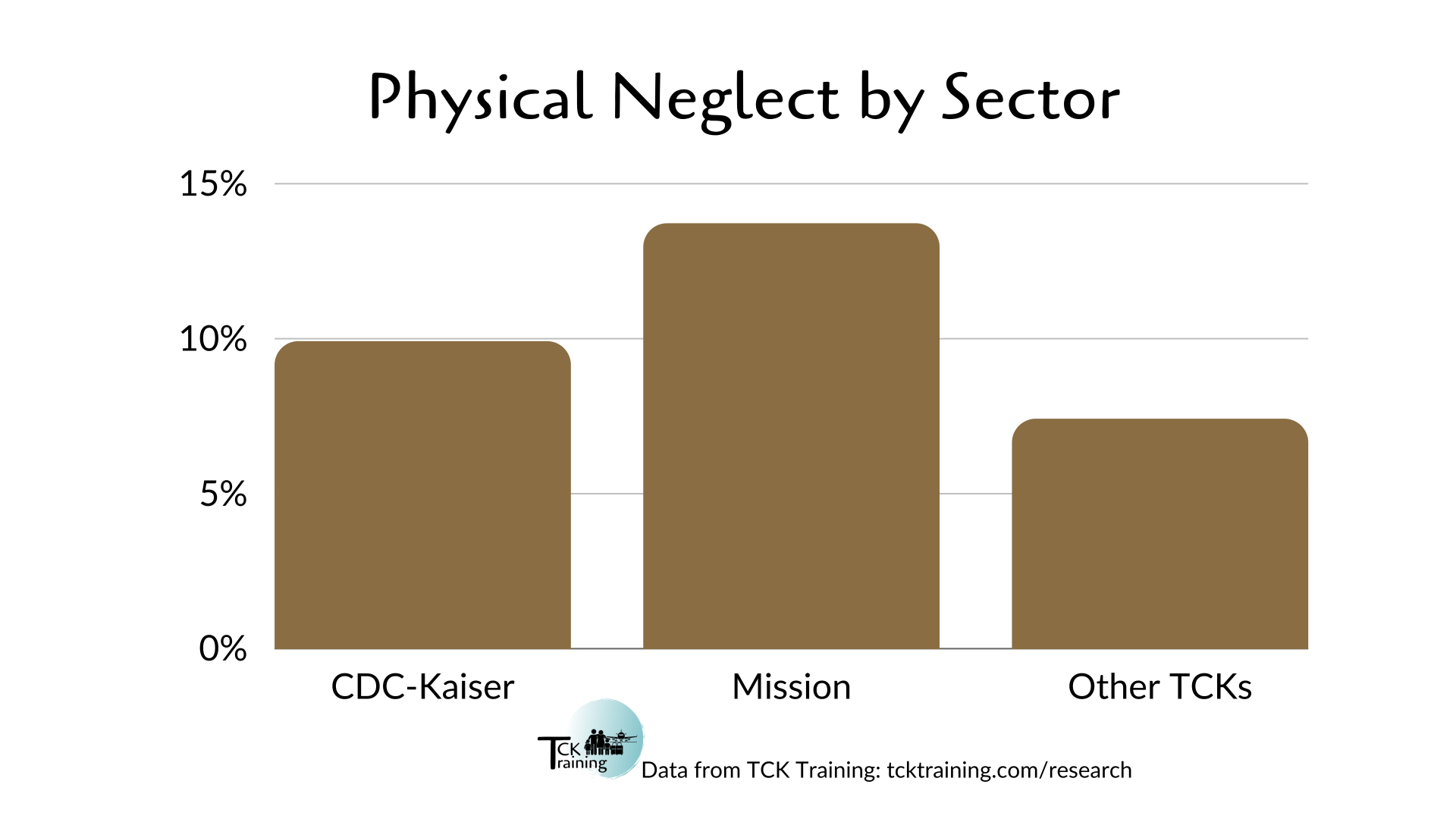
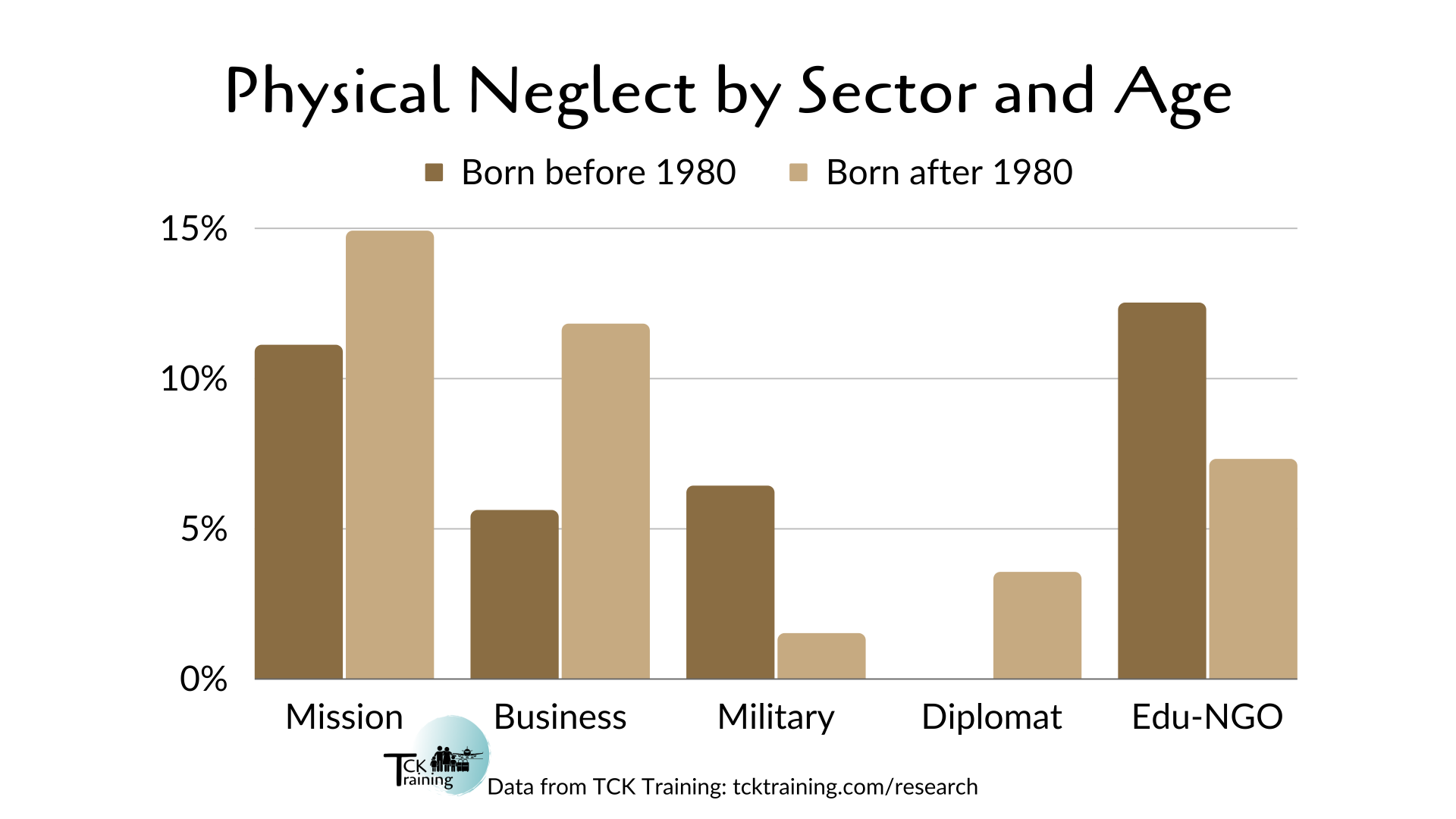
Household dysfunction encompasses household adult mental illness, parental violence, parental divorce or separation, household adult incarceration, and household adult substance abuse. Incarceration was so low among TCKs that we have not included it in this summary.
Household Adult Mental Illness
Household adult mental illness is an ACE assigned to anyone who had an adult living in their home during childhood who was depressed, mentally ill, or attempted suicide. 39% of TCKs overall and 42%-44% of TCKs born after 1980 (depending on their sector) reported household adult mental illness. 39% of missionary kids reported Household Adult Mental Illness, 2x the rate of Americans. 30% of Boomer/Gen X missionary kids (born before 1980) reported household adult mental illness. However, the rate increased by a third in younger generations (those born after 1980) with nearly 2 out of every 5 reporting household adult mental illness.
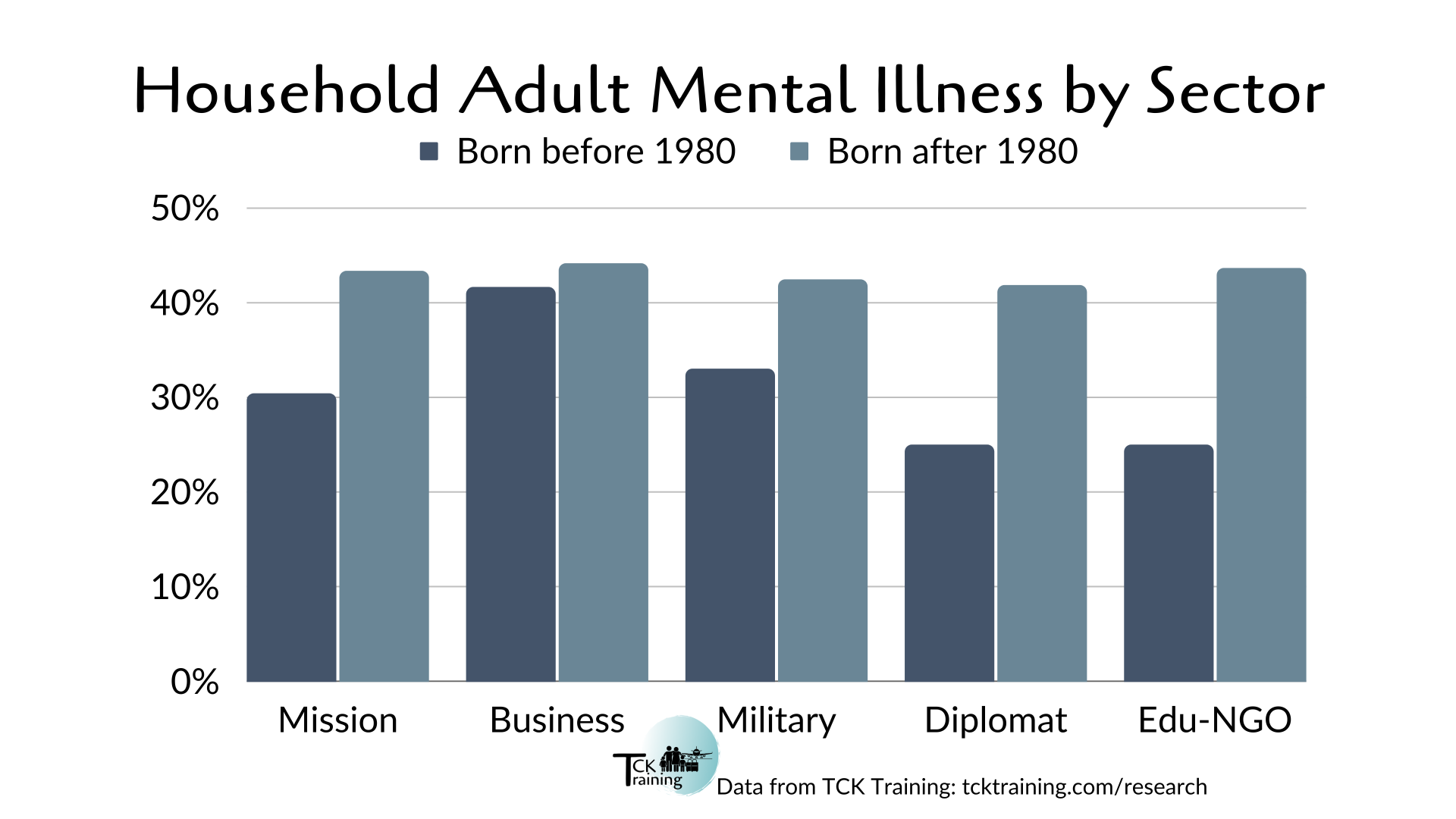
Parental violence is defined as a child being impacted by, even if not actually witnessing, violence toward a mother/step-mother or father/step-father. Missionary kids were 3x less likely to experience parental violence than Americans. However, the mission sector was the only sector to not see a decrease over time. While there is not a significant increase, the fact that there is any increase at all indicates care is needed.
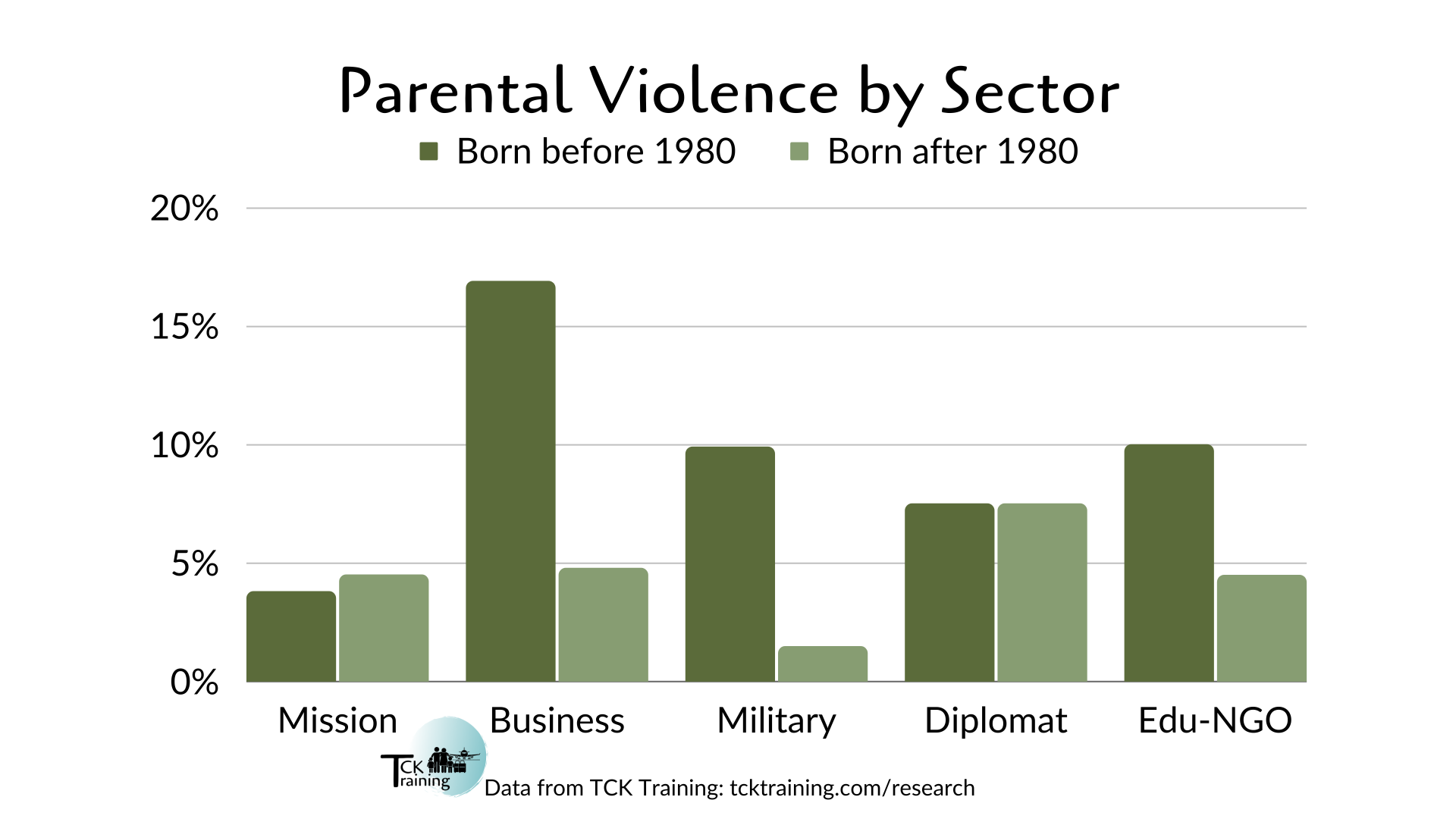
While rates of parental divorce/separation was 23% in the CDC-Kaiser study, it was much lower among TCKs. All sectors saw a decrease in the divorce rate over time. Among missionary kids, divorce was very low at not even 2% of those who were surveyed. That said, correlation is not causation, and the low rate of divorce does not necessarily indicate healthy marriages.
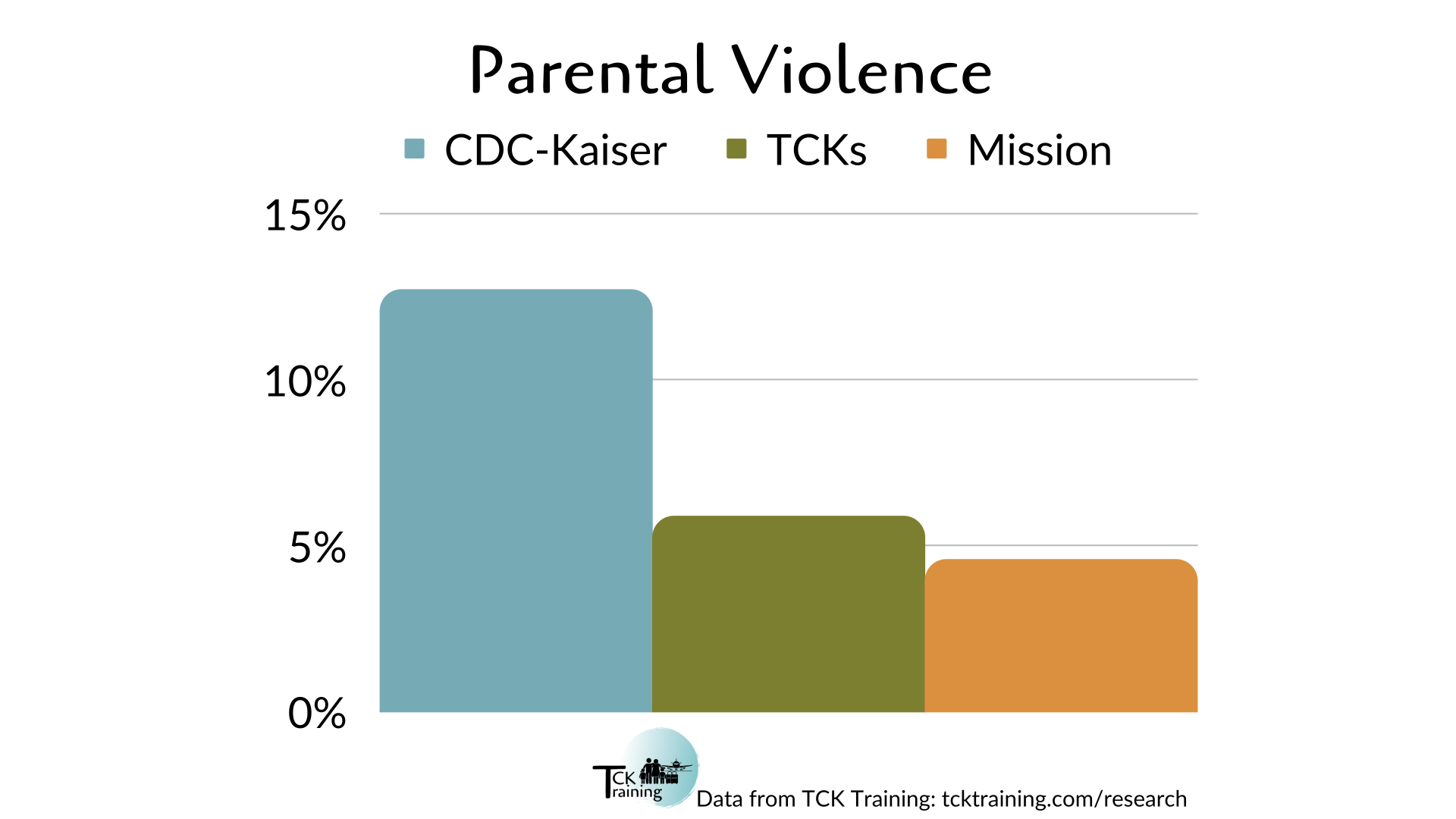
Substance abuse as an ACE factor means that an adult living in the home was an alcoholic or used illicit drugs. While household adult substance abuse was nearly non-existent at 3% among missionary kids, the trends among older and younger generations were distinctive. While most other sectors showed a downward trend from older to younger generations in household adult substance abuse, missionary kids showed an increase between older and younger generations. While small, the younger generation of missionary kids reported a rate 1.5x higher than older missionary kids. This seems to be another sign of families under stress, needing care and support.
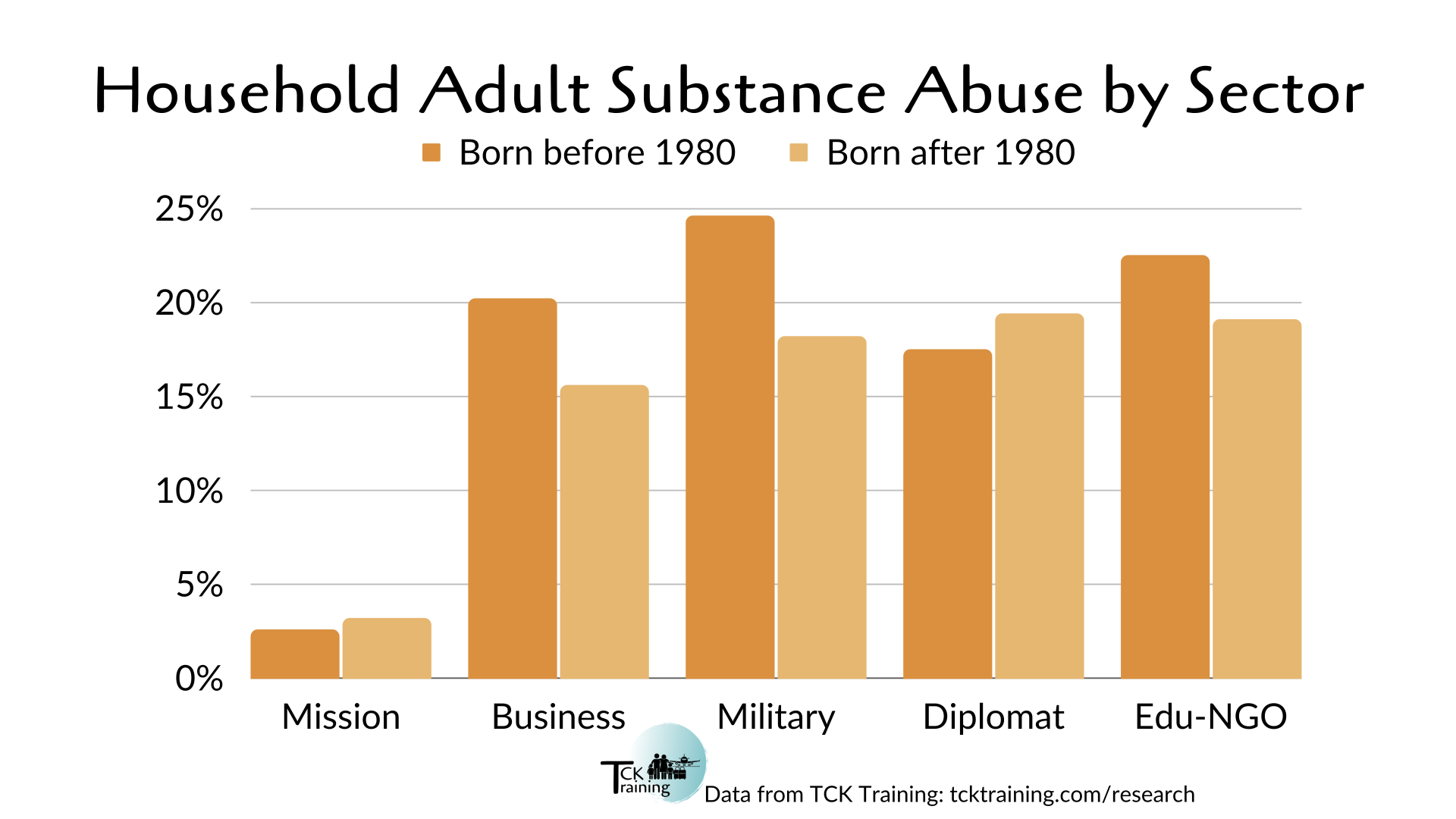
This data can seem pretty disheartening but there is hope found in strategies to mitigate the risks we’ve talked about. These challenges and risks are not unsolvable or reasons to despair, but rather reasons to take action in intentional ways that reflect the urgency of the matter. Globally mobile families are better able to meet their children’s needs when they are well supported by their sending agency and community.
Furthermore, child protection is essential, and organization-level strategies should be put in place to safeguard children. Additionally, families also need education to understand not only the rewards but also the risks for international life. When a mission organization sends them abroad, that mission organization also bears responsibility for providing adequate information and effective support. Mission organizations can be wonderful, but they also need institutional backing to provide the best care possible.
Protective factors such as Positive Childhood Experiences, healthy parent-child relationships, and healthy parental mental health are all tangible aspects of intentionality. Each protective factor will assist in mitigating the risk of Adverse Childhood Experiences taking their toll on mission children long term.
As you’re working to implement organizational-level strategies to care for families your organization is sending abroad, TCK Training is here to help! We offer a range of training and support, both organization-wide and for individual families. For example, you can learn about Preventing TCK Neglect as an Organization, Sexual Abuse Awareness Training, or applying our research in context. We also have resources designed specifically for the mission community, such as Biblical Foundations for MK Care, and our Open & Go TCK Retreat Curriculums, which are perfect for supporting mission kids at your organization conference or area retreat.
Check out this list of Related Blog Posts, or click through the tabs to find recommended resources according to whether you're a caregiver or parent of missionary kids, or you're an adult missionary kid yourself!
For Caregivers of Missionary TCKs:
Caregivers, as you read these statistics you may be feeling both motivation that there are needs you want to fill...and overwhelm not knowing how or where to start. You are not alone.
We've personally experienced how nerve wracking it can be to have the big and important role of caring for MKs ahead of you, but not feel equipped for it. Which is why we do what we do, we want you to experience the relief and confidence of being equipped and supported!
Get equipped with certifications and trainings
- Pathways Certification (for those in leadership and program development)
- Groundwork Certification (for those working on the ground with MK families
- Standards of Missionary Family Care Training
- Churches Supporting Missionary Families
Other resources
- FREE Biblical Foundations for MK Care (booklet)
- TCK Biblical Conversations (curriculum)
- Biblical Foundations for MK Care (workshop)
- Discipling Missionary Kids (workshop) ...or get access to both workshops plus 80+ more AND monthly group coaching with a Caregiver membership
For Parents of Missionary TCKs
Reading these statistics can be difficult. We know how much you love your TCKs and you want what's best for them. So please know there is hope!
We do this research because "when we know better we can do better" (Tanya Crossman) and we believe that together we can raise up a generation of healthy TCKs.
We design our resources to equip parents and caregivers to support TCKs according to the needs found in our research! If you're not sure where to start, here's a few we would recommend:
- FREE Biblical Foundations for MK Care (booklet)
- TCK Biblical Conversations (curriculum)
- Biblical Foundations for MK Care (workshop)
- Discipling Missionary Kids (workshop) ...or get access to both workshops plus 50+ more AND monthly group coaching with a Parent membership
For Adult Missionary Kids
If you resonated with a lot of these statistics, we want you to know that you're not alone, and we don't want you to carry this alone!
Here's some resources we would recommend specifically for you:
- Unstacking Your Grief Tower (book)
- Unstacking Your Grief Tower (self-guided course)
- Unstacking Sessions (personalized coaching)
Recorded Workshops
- Navigating Christianity as an Adult MK
- Adult TCKs: Strengths & Challenges
- Adult TCKs: How to Talk to Your Parents about Childhood Trauma
...or get access to all three plus 20+ more with an ATCK membership
References:
- Caution and Hope: The Prevalence of Adverse Childhood Experiences in Globally Mobile Third Culture Kids (Crossman and Wells, 2022. TCK Training.)
- TCKs at Risk: Risk Factors and Risk Mitigation for Globally Mobile Families (Crossman, Wells and Vahey Smith, 2022. TCK Training.)
- Caution and Hope for Missionary Kids (Blog post, Crossman. TCK Training, 2022.)



